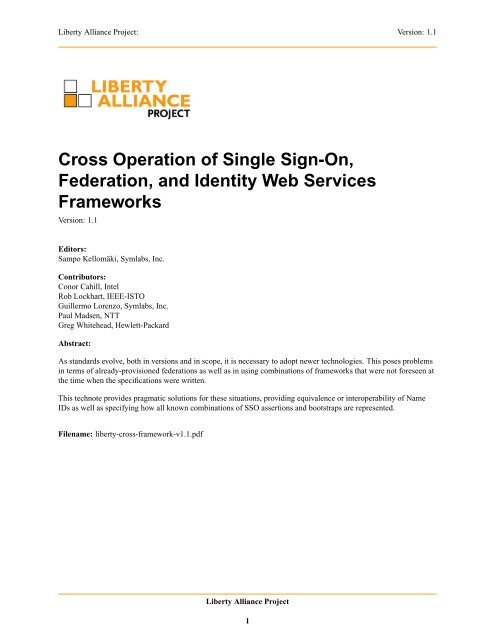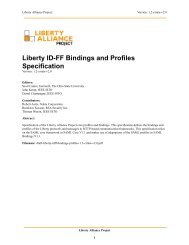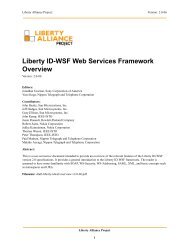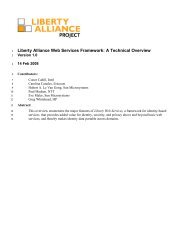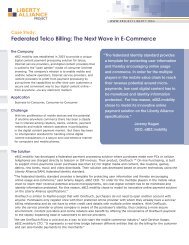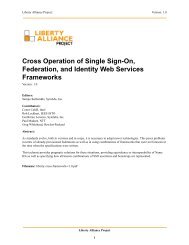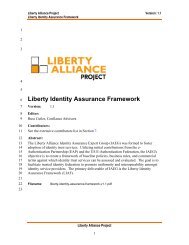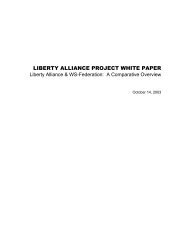Cross Operation of Single Sign-On, Federation ... - Liberty Alliance
Cross Operation of Single Sign-On, Federation ... - Liberty Alliance
Cross Operation of Single Sign-On, Federation ... - Liberty Alliance
You also want an ePaper? Increase the reach of your titles
YUMPU automatically turns print PDFs into web optimized ePapers that Google loves.
<strong>Liberty</strong> <strong>Alliance</strong> Project: Version: 1.1<br />
<strong>Cross</strong> <strong>Operation</strong> <strong>of</strong> <strong>Single</strong> <strong>Sign</strong>-<strong>On</strong>,<br />
<strong>Federation</strong>, and Identity Web Services<br />
Frameworks<br />
Version: 1.1<br />
Editors:<br />
Sampo Kellomäki, Symlabs, Inc.<br />
Contributors:<br />
Conor Cahill, Intel<br />
Rob Lockhart, IEEE-ISTO<br />
Guillermo Lorenzo, Symlabs, Inc.<br />
Paul Madsen, NTT<br />
Greg Whitehead, Hewlett-Packard<br />
Abstract:<br />
As standards evolve, both in versions and in scope, it is necessary to adopt newer technologies. This poses problems<br />
in terms <strong>of</strong> already-provisioned federations as well as in using combinations <strong>of</strong> frameworks that were not foreseen at<br />
the time when the specifications were written.<br />
This technote provides pragmatic solutions for these situations, providing equivalence or interoperability <strong>of</strong> Name<br />
IDs as well as specifying how all known combinations <strong>of</strong> SSO assertions and bootstraps are represented.<br />
Filename: liberty-cross-framework-v1.1.pdf<br />
<strong>Liberty</strong> <strong>Alliance</strong> Project<br />
1
<strong>Liberty</strong> <strong>Alliance</strong> Project: Version: 1.1<br />
<strong>Cross</strong> <strong>Operation</strong> <strong>of</strong> <strong>Single</strong> <strong>Sign</strong>-<strong>On</strong>, <strong>Federation</strong>, and Identity Web Services Frameworks<br />
1<br />
2<br />
3<br />
4<br />
5<br />
6<br />
7<br />
8<br />
9<br />
10<br />
11<br />
12<br />
13<br />
14<br />
15<br />
16<br />
17<br />
18<br />
19<br />
20<br />
21<br />
22<br />
23<br />
24<br />
25<br />
26<br />
27<br />
28<br />
29<br />
30<br />
31<br />
32<br />
33<br />
34<br />
35<br />
36<br />
37<br />
Notice<br />
This document has been prepared by Sponsors <strong>of</strong> the <strong>Liberty</strong> <strong>Alliance</strong>. Permission is hereby granted to use the<br />
document solely for the purpose <strong>of</strong> implementing the Specification. No rights are granted to prepare derivative works<br />
<strong>of</strong> this Specification. Entities seeking permission to reproduce portions <strong>of</strong> this document for other uses must contact<br />
the <strong>Liberty</strong> <strong>Alliance</strong> to determine whether an appropriate license for such use is available.<br />
Implementation <strong>of</strong> certain elements <strong>of</strong> this document may require licenses under third party intellectual property<br />
rights, including without limitation, patent rights. The Sponsors <strong>of</strong> and any other contributors to the Specification are<br />
not and shall not be held responsible in any manner for identifying or failing to identify any or all such third party<br />
intellectual property rights. This Specification is provided "AS IS", and no participant in the <strong>Liberty</strong> <strong>Alliance</strong><br />
makes any warranty <strong>of</strong> any kind, express or implied, including any implied warranties <strong>of</strong> merchantability,<br />
non-infringement <strong>of</strong> third party intellectual property rights, and fitness for a particular purpose. Implementers<br />
<strong>of</strong> this Specification are advised to review the <strong>Liberty</strong> <strong>Alliance</strong> Project’s website (http://www.projectliberty.org/) for<br />
information concerning any Necessary Claims Disclosure Notices that have been received by the <strong>Liberty</strong> <strong>Alliance</strong><br />
Management Board.<br />
Copyright © 2006 2FA Technology; Adobe Systems; Agencia Catalana De Certificacio; America <strong>On</strong>line, Inc.;<br />
American Express Company; Ams<strong>of</strong>t Systems Pvt Ltd.; Avatier Corporation; BIPAC; BMC S<strong>of</strong>tware, Inc.; Bank <strong>of</strong><br />
America Corporation; Beta Systems S<strong>of</strong>tware AG; British Telecommunications plc; Computer Associates<br />
International, Inc.; Credentica; DataPower Technology, Inc.; Deutsche Telekom AG, T-Com; Diamelle Technologies,<br />
Inc.; Diversinet Corp.; Drummond Group Inc.; Enosis Group LLC; Entrust, Inc.; Epok, Inc.; Ericsson; Falkin<br />
Systems LLC; Fidelity Investments; Forum Systems, Inc.; France Télécom; French Government Agence pour le<br />
développement de l’administration électronique (ADAE); Fugen Solutions, Inc; Fulvens Ltd.; GSA Office <strong>of</strong><br />
Governmentwide Policy; Gamefederation; Gemalto; General Motors; Geo<strong>Federation</strong>; Giesecke & Devrient GmbH;<br />
Hewlett-Packard Company; Hochhauser & Co., LLC; IBM Corporation; Intel Corporation; Intuit Inc.; Kantega;<br />
Kayak Interactive; Livo Technologies; Luminance Consulting Services; MasterCard International; MedCommons<br />
Inc.; Mobile Telephone Networks (Pty) Ltd; NEC Corporation; NTT DoCoMo, Inc.; Netegrity, Inc.; Neustar, Inc.;<br />
New Zealand Government State Services Commission; Nippon Telegraph and Telephone Corporation; Nokia<br />
Corporation; Novell, Inc.; OpenNetwork; Oracle Corporation; Ping Identity Corporation; RSA Security Inc.;<br />
Reactivity Inc.; Royal Mail Group plc; SAP AG; Senforce; Sharp Laboratories <strong>of</strong> America; Sigaba; SmartTrust; Sony<br />
Corporation; Sun Microsystems, Inc.; Supremacy Financial Corporation; Symlabs, Inc.; Telecom Italia S.p.A.;<br />
Telefónica Móviles, S.A.; Telenor R&D; Thales e-Security; Trusted Network Technologies; UNINETT AS; UTI;<br />
Veri<strong>Sign</strong>, Inc.; Vodafone Group Plc.; Wave Systems Corp. All rights reserved.<br />
<strong>Liberty</strong> <strong>Alliance</strong> Project<br />
Licensing Administrator<br />
c/o IEEE-ISTO<br />
445 Hoes Lane<br />
Piscataway, NJ 08855-1331, USA<br />
info@projectliberty.org<br />
<strong>Liberty</strong> <strong>Alliance</strong> Project<br />
2
<strong>Liberty</strong> <strong>Alliance</strong> Project: Version: 1.1<br />
<strong>Cross</strong> <strong>Operation</strong> <strong>of</strong> <strong>Single</strong> <strong>Sign</strong>-<strong>On</strong>, <strong>Federation</strong>, and Identity Web Services Frameworks<br />
38<br />
39<br />
40<br />
41<br />
42<br />
43<br />
44<br />
45<br />
46<br />
47<br />
48<br />
49<br />
50<br />
51<br />
52<br />
53<br />
54<br />
55<br />
56<br />
57<br />
58<br />
Contents<br />
1. Introduction . . . . . . . . . . . . . . . . . . . . . . . . . . . . . . . . . . . . . . . . . . . . . . . . . . . . . . . . . . . . . . . . . . . . . . . . . . . . . . . . . . . . 4<br />
1.1. Notational Conventions . . . . . . . . . . . . . . . . . . . . . . . . . . . . . . . . . . . . . . . . . . . . . . . . . . . . . . . . . . . . . . . . . . . 4<br />
2. Name ID Compatibility Between SAML 1.x, ID-FF 1.x, and SAML 2.0 . . . . . . . . . . . . . . . . . . . . . . . . . . . . . . 5<br />
2.1. An Introduction to Name IDs . . . . . . . . . . . . . . . . . . . . . . . . . . . . . . . . . . . . . . . . . . . . . . . . . . . . . . . . . . . . . .5<br />
2.2. NameQualifiers Across Versions . . . . . . . . . . . . . . . . . . . . . . . . . . . . . . . . . . . . . . . . . . . . . . . . . . . . . . . . . . . 5<br />
2.3. Name ID Formats . . . . . . . . . . . . . . . . . . . . . . . . . . . . . . . . . . . . . . . . . . . . . . . . . . . . . . . . . . . . . . . . . . . . . . . . 6<br />
3. Independence <strong>of</strong> SSO (a.k.a. <strong>Federation</strong>) Framework from WS Framework . . . . . . . . . . . . . . . . . . . . . . . . . . . . 7<br />
3.1. Guidance for <strong>Cross</strong> Use <strong>of</strong> SSO and WS Frameworks . . . . . . . . . . . . . . . . . . . . . . . . . . . . . . . . . . . . . . . . 7<br />
3.2. Trivial Interoperability . . . . . . . . . . . . . . . . . . . . . . . . . . . . . . . . . . . . . . . . . . . . . . . . . . . . . . . . . . . . . . . . . . . .7<br />
3.3. Interoperability Between SAML 2.0 SSO and <strong>Liberty</strong> ID-WSF 1.1 . . . . . . . . . . . . . . . . . . . . . . . . . . . . 7<br />
3.4. General Interoperability Between SSO and ID-WSF . . . . . . . . . . . . . . . . . . . . . . . . . . . . . . . . . . . . . . . . . 8<br />
4. Using ID-WSF 1.x Service Specifications with ID-WSF 2.0 . . . . . . . . . . . . . . . . . . . . . . . . . . . . . . . . . . . . . . . . . 9<br />
4.1. ResourceIDs . . . . . . . . . . . . . . . . . . . . . . . . . . . . . . . . . . . . . . . . . . . . . . . . . . . . . . . . . . . . . . . . . . . . . . . . . . . . 9<br />
4.2. Action URIs . . . . . . . . . . . . . . . . . . . . . . . . . . . . . . . . . . . . . . . . . . . . . . . . . . . . . . . . . . . . . . . . . . . . . . . . . . . . .9<br />
4.3. DST 2.0 Subscriptions . . . . . . . . . . . . . . . . . . . . . . . . . . . . . . . . . . . . . . . . . . . . . . . . . . . . . . . . . . . . . . . . . . . .9<br />
4.4. Example – Personal Pr<strong>of</strong>ile Service . . . . . . . . . . . . . . . . . . . . . . . . . . . . . . . . . . . . . . . . . . . . . . . . . . . . . . . . 9<br />
5. Examples . . . . . . . . . . . . . . . . . . . . . . . . . . . . . . . . . . . . . . . . . . . . . . . . . . . . . . . . . . . . . . . . . . . . . . . . . . . . . . . . . . . . . 11<br />
5.1. SAML 2.0 SSO with ID-WSF 1.1 and 2.0 Bootstraps . . . . . . . . . . . . . . . . . . . . . . . . . . . . . . . . . . . . . . . 11<br />
5.2. ID-FF 1.2 SSO with ID-WSF 1.1 and 2.0 Bootstraps . . . . . . . . . . . . . . . . . . . . . . . . . . . . . . . . . . . . . . . .13<br />
References . . . . . . . . . . . . . . . . . . . . . . . . . . . . . . . . . . . . . . . . . . . . . . . . . . . . . . . . . . . . . . . . . . . . . . . . . . . . . . . . . . . . . . 16<br />
<strong>Liberty</strong> <strong>Alliance</strong> Project<br />
3
<strong>Liberty</strong> <strong>Alliance</strong> Project: Version: 1.1<br />
<strong>Cross</strong> <strong>Operation</strong> <strong>of</strong> <strong>Single</strong> <strong>Sign</strong>-<strong>On</strong>, <strong>Federation</strong>, and Identity Web Services Frameworks<br />
59<br />
60<br />
61<br />
62<br />
63<br />
64<br />
65<br />
66<br />
67<br />
68<br />
69<br />
70<br />
71<br />
1. Introduction<br />
As standards evolve, both in versions and in scope, it is necessary to adopt newer technologies. This poses problems<br />
in terms <strong>of</strong> already-provisioned federations as well as in using combinations <strong>of</strong> frameworks that were not foreseen at<br />
the time when the specifications were written.<br />
This technote provides specific solutions to these advanced problems. For introductory material, see [<strong>Liberty</strong>IDWS-<br />
FGuide10].<br />
1.1. Notational Conventions<br />
In case <strong>of</strong> disagreement between the present document and any guidelines or [XML] schema descriptions, this<br />
document is prescriptive. Any published errata is hereby incorporated to this document by reference and as such<br />
is normative.<br />
The key words "MUST," "MUST NOT," "REQUIRED," "SHALL," "SHALL NOT," "SHOULD," "SHOULD NOT,"<br />
"RECOMMENDED," "MAY," and "OPTIONAL" in this specification are to be interpreted as described in IETF<br />
[RFC2119].<br />
<strong>Liberty</strong> <strong>Alliance</strong> Project<br />
4
<strong>Liberty</strong> <strong>Alliance</strong> Project: Version: 1.1<br />
<strong>Cross</strong> <strong>Operation</strong> <strong>of</strong> <strong>Single</strong> <strong>Sign</strong>-<strong>On</strong>, <strong>Federation</strong>, and Identity Web Services Frameworks<br />
72<br />
73<br />
74<br />
75<br />
76<br />
77<br />
78<br />
79<br />
80<br />
81<br />
82<br />
83<br />
84<br />
85<br />
86<br />
87<br />
88<br />
89<br />
90<br />
91<br />
92<br />
93<br />
94<br />
95<br />
96<br />
97<br />
98<br />
99<br />
100<br />
101<br />
102<br />
103<br />
104<br />
105<br />
106<br />
107<br />
108<br />
109<br />
110<br />
111<br />
112<br />
113<br />
2. Name ID Compatibility Between SAML 1.x, ID-FF 1.x, and SAML<br />
2.0<br />
SAML assertions are the basis <strong>of</strong> most modern <strong>Single</strong> <strong>Sign</strong>-<strong>On</strong> (SSO) and <strong>Federation</strong> Frameworks. There is a frequent<br />
need to migrate already-existing federations between the different versions <strong>of</strong> SAML assertions or, indeed, serve from<br />
the same federation database, both SAML 2.0 [SAMLCore2] and SAML 1.1 [SAMLCore] assertions, simultaneously,<br />
as would be necessary in heterogeneous environments <strong>of</strong> partners supporting different versions <strong>of</strong> SAML.<br />
Historically, <strong>Liberty</strong> ID-FF and, lately, SAML 2.0 have evolved towards a better understood and more coherent Name<br />
ID, or pseudonym, format and management system. The SAML 2.0 incarnation represents the current culmination <strong>of</strong><br />
this evolution. While the Name ID format varies between SAML versions and while the additional semantics attached<br />
by various <strong>Liberty</strong> ID-FF versions vary, as well, it is possible to define a least common denominator format. In this<br />
discussion, we are mainly concerned with pseudonyms because they are characteristically used in federation databases.<br />
Other formats, such as temporary Name IDs, do not present similar problems.<br />
By adopting the conventions described below, it is possible to support many types <strong>of</strong> federation protocols from one<br />
federation database.<br />
2.1. An Introduction to Name IDs<br />
A SAML 1.1 carries NameQualifier and Format [XML] attributes. See [SAMLCore] Section<br />
2.4.2.2 "Element ," p. 18.<br />
A SAML 2.0 , which is <strong>of</strong> XSD type NameIDType, carries NameQualifier, SPNameQualifier,<br />
Format, and SPProvidedID [XML] attributes. See [SAMLCore2], Section 2.2.2 "Complex Type NameIDType," p.<br />
13.<br />
<strong>Liberty</strong> ID-FF 1.2 [<strong>Liberty</strong>ProtSchema], Section 3.1.11.1 "Deprecation <strong>of</strong> ID-FF 1.1 Name Identifier Practices,"<br />
discusses some problems that older versions <strong>of</strong> the specifications have with respect to Name IDs.<br />
2.2. NameQualifiers Across Versions<br />
For each federation, the IdP always assigns a Name ID for the Principal, but it is qualified by the namespace <strong>of</strong> the<br />
SP towards which the Principal is federated. By convention, the namespace qualification is expressed by carrying the<br />
Provider ID or Entity ID <strong>of</strong> the SP, or the affiliation to which the SP belongs, in the NameQualifier. Both versions<br />
<strong>of</strong> SAML assertions work the same in this regard.<br />
Versions <strong>of</strong> ID-FF prior to 1.2 did not support affiliations and did not require any NameQualifier to be specified, but,<br />
unfortunately, allowed it to be specified without specifying what the allowable values were. If an old federation has a<br />
nonstandard NameQualifier, then that should be kept in a database and reproduced when using <strong>Liberty</strong> ID-FF 1.0<br />
or 1.1 protocols. However, when talking <strong>Liberty</strong> ID-FF 1.2 or SAML 2.0 protocol, the old NameQualifier MUST<br />
be ignored and the Provider ID or Entity ID used instead.<br />
For each federation, it is possible for the SP to register an additional Name ID, which will be sent back to the SP<br />
whenever the IdP talks to the SP about the given federation. However, <strong>Liberty</strong> ID-FF 1.2 and SAML 2.0 behave<br />
differently in this regard. In SAML 2.0, the SP Name ID is always carried in SPProvidedID, which can be<br />
namespace-qualified using SPNameQualifier, which contains the affiliation ID <strong>of</strong> the SP, if any, or, otherwise,<br />
the entity ID <strong>of</strong> the SP.<br />
ID-FF 1.x extended the SAML Subject to add an IDPProvidedNameIdentifier element in addition to .<br />
In the case where there is no SP-provided Name ID, then both Subject/NameIdentifier and<br />
Subject/IDPProvidedNameIdentifier are the IdP-provided Name ID. In the case where there is an SP-provided<br />
Name ID, it goes in Subject/NameIdentifier and Subject/IDPProvidedNameIdentifier is the IdP-provided<br />
Name ID.<br />
<strong>Liberty</strong> <strong>Alliance</strong> Project<br />
5
<strong>Liberty</strong> <strong>Alliance</strong> Project: Version: 1.1<br />
<strong>Cross</strong> <strong>Operation</strong> <strong>of</strong> <strong>Single</strong> <strong>Sign</strong>-<strong>On</strong>, <strong>Federation</strong>, and Identity Web Services Frameworks<br />
114<br />
115<br />
116<br />
117<br />
118<br />
119<br />
120<br />
121<br />
122<br />
123<br />
124<br />
125<br />
126<br />
127<br />
In SAML 1.1, there is no special way to express the SP-registered Name ID. By convention, in communications<br />
towards the SP, the contains (properly namespace-qualified) the SP-registered Name ID, if any, or,<br />
otherwise, the IdP-assigned Name ID. In communications towards the IdP, the always carries the<br />
IdP-assigned Name ID.<br />
NameQualifier and Format in an ID-FF SP-provided Name ID is discarded when translating to SAML 2.0 unless<br />
they happen to correspond to the SAML 2.0-specified values. Clearly, this could be problematic and, practically, it<br />
restricts interoperability to the cases where implementations are not dependent on these values being preserved. ID-FF<br />
1.x deployments that are using these features may need to take the step <strong>of</strong> updating their federations to be SAML<br />
2.0-compatible before attempting migration or interoperability.<br />
In various versions <strong>of</strong> <strong>Liberty</strong> ID-FF, different rules, which may or may not differ from the base convention, apply to<br />
what is appropriate to carry in the when using the Name ID Registration protocol. Understanding<br />
these is left as an exercise to the reader.<br />
Conclusion: NameQualifiers are interoperable between SAML 2.0, <strong>Liberty</strong> ID-FF 1.2, and SAML<br />
1.1. Earlier versions <strong>of</strong> <strong>Liberty</strong> ID-FF require special case treatment.<br />
128<br />
129<br />
130<br />
131<br />
132<br />
133<br />
134<br />
135<br />
136<br />
137<br />
138<br />
139<br />
140<br />
141<br />
142<br />
143<br />
144<br />
145<br />
146<br />
2.3. Name ID Formats<br />
In SAML, a Name ID may have different formats. Of interest here is the pseudonymous format, a.k.a. persistent<br />
format. SAML 1.1 [SAMLCore], Section 7.3 "NameIdentifier Format Identifiers," p. 49, does not specify<br />
this format, but <strong>Liberty</strong> ID-FF 1.2 [<strong>Liberty</strong>ProtSchema], Section 3.2.2.3 "SubjectType and Related Types," p. 18,<br />
specifies urn:liberty:iff:nameid:federated and, in Section 3.2.1.1 "Element ," p. 14,<br />
a corresponding enumerator federated. SAML 2.0 [SAMLCore2], Section 8.3.7 "Persistent<br />
Identifier," p. 79, specifies urn:oasis:names:tc:SAML:2.0:nameid-format:persistent and also specifies,<br />
in Section 3.4.1.1 "Element ," p. 50, that the same enumerator is used as NameIDPolicy.<br />
We adopt the convention that urn:liberty:iff:nameid:federated and urn:oasis:names:tc:SAML:2.0:<br />
nameid-format:persistent are treated synonymously such that if a federation database has a Name ID in the<br />
former format, it MUST be reported in SAML 2.0 transactions as the latter format, and if a database has a Name ID in<br />
the latter format, it MUST be reported in SAML 1.1 or <strong>Liberty</strong> ID-FF transactions as the former format.<br />
We also adopt the convention that ID-FF 1.2 urn:liberty:iff:nameid:one-time is mapped to<br />
urn:oasis:names:tc:SAML:2.0:nameid-format:transient and vice versa, as needed.<br />
Both versions <strong>of</strong> SAML specify the Name ID as xs:string, thus, the actual value <strong>of</strong> the Name ID does NOT<br />
have compatibility issues. However, we RECOMMEND that Name IDs be URIs for improved compatibility and be<br />
restricted to the character set <strong>of</strong> safe base 64 encoding [RFC3548] for maximum compatibility.<br />
Conclusion: Name ID Formats are interoperable by treating federated (ID-FF) and persistent<br />
(SAML 2.0) as equivalent.<br />
<strong>Liberty</strong> <strong>Alliance</strong> Project<br />
6
<strong>Liberty</strong> <strong>Alliance</strong> Project: Version: 1.1<br />
<strong>Cross</strong> <strong>Operation</strong> <strong>of</strong> <strong>Single</strong> <strong>Sign</strong>-<strong>On</strong>, <strong>Federation</strong>, and Identity Web Services Frameworks<br />
147<br />
148<br />
149<br />
150<br />
151<br />
152<br />
153<br />
154<br />
155<br />
156<br />
157<br />
158<br />
3. Independence <strong>of</strong> SSO (a.k.a. <strong>Federation</strong>) Framework from WS<br />
Framework<br />
3.1. Guidance for <strong>Cross</strong> Use <strong>of</strong> SSO and WS Frameworks<br />
<strong>Single</strong> <strong>Sign</strong>-<strong>On</strong> (SSO) frameworks (<strong>of</strong>ten referred to as <strong>Federation</strong> Frameworks), such as SAML 2.0 [SAMLCore2]<br />
and <strong>Liberty</strong> ID-FF 1.2 [<strong>Liberty</strong>ProtSchema], are nearly entirely disjoint from Identity Web Services frameworks such<br />
as <strong>Liberty</strong> ID-WSF 1.0, ID-WSF 1.1 [<strong>Liberty</strong>IDWSFGuide10], and ID-WSF 2.0 [<strong>Liberty</strong>IDWSFGuide]. The only<br />
connection occurs when, as part <strong>of</strong> an SSO, a discovery bootstrap is conveyed. Therefore, it is desirable to decouple<br />
the choice <strong>of</strong> SSO framework from the choice <strong>of</strong> Identity Web Services frameworks.<br />
Each framework makes an independent choice <strong>of</strong> the version <strong>of</strong> SAML assertions that is used within its own sphere.<br />
A different version can be pr<strong>of</strong>itably used in each sphere, thus all combinations in the accompanying table are valid.<br />
However, <strong>Liberty</strong> ID-FF 1.2 with ID-WSF 2.0, but only using SAML 1.1 assertions for both, is NOT valid. Similarly,<br />
SAML 2.0 with ID-WSF 1.1, but only using SAML 2.0 assertions for both, is not valid.<br />
159<br />
Table 1. Valid Combinations <strong>of</strong> Frameworks and SAML versions: SSO Assertion Version (Bootstrap Assertion Version)<br />
ID-WSF 1.1 ID-WSF 2.0<br />
SAML 2.0 protocol SAML 2.0 ( SAML 1.1 ) SAML 2.0 ( SAML 2.0 )<br />
<strong>Liberty</strong> ID-FF 1.2 SAML 1.1 ( SAML 1.1 ) SAML 1.1 ( SAML 2.0 )<br />
160<br />
161<br />
162<br />
163<br />
164<br />
165<br />
166<br />
167<br />
168<br />
169<br />
170<br />
171<br />
172<br />
173<br />
174<br />
175<br />
176<br />
177<br />
The SSO operation results in a <strong>Federation</strong> framework-dependent version <strong>of</strong> a SAML assertion that carries an ID-WSF<br />
version-dependent SAML assertion. All versions <strong>of</strong> SAML assertions support attribute statements and an attribute<br />
statement 1 is capable <strong>of</strong> carrying an arbitrary payload. There is no problem in the inner assertion being <strong>of</strong> a different<br />
version than the assertion carrying the attribute statement. Implementations wishing to support cross operation will<br />
simply need to support multiple versions <strong>of</strong> SAML.<br />
3.2. Trivial Interoperability<br />
Interoperability <strong>of</strong> <strong>Liberty</strong> ID-FF 1.2 with <strong>Liberty</strong> ID-WSF 1.1 is described in [<strong>Liberty</strong>Disco12], Section 6 "SAML<br />
AttributeDesignator for Discovery ResourceOffering."<br />
Interoperability <strong>of</strong> <strong>Liberty</strong> ID-FF 1.2 and SAML 2.0 with <strong>Liberty</strong> ID-WSF 2.0 is described in [<strong>Liberty</strong>Disco].<br />
3.3. Interoperability Between SAML 2.0 SSO and <strong>Liberty</strong> ID-WSF 1.1<br />
It turns out that <strong>Liberty</strong> ID-WSF 1.1 in [<strong>Liberty</strong>Disco12], Section 6 "SAML AttributeDesignator for Discovery<br />
ResourceOffering," p. 23, appears to have an unnecessary restriction hampering interoperability in that the namespace<br />
prefix saml: actually is bound to SAML 1.1. There is no need to make this restriction.<br />
To carry a <strong>Liberty</strong> ID-WSF 1.1 bootstrap in a SAML 2.0 SSO assertion, the following convention is adopted.<br />
• The Attribute/@Name MUST be "urn:liberty:disco:2003-08:DiscoveryResourceOffering."<br />
• The Attribute/@NameFormat MUST be "urn:oasis:names:tc:SAML:2.0:attrname-format:uri."<br />
• <strong>On</strong>e or more elements MUST be included and each <strong>of</strong> them MUST contain a single <br />
(usually referring to a Discovery Service).<br />
1 For ID-WSF 1.x, the security token is carried in Advice, not in the attribute value.<br />
<strong>Liberty</strong> <strong>Alliance</strong> Project<br />
7
<strong>Liberty</strong> <strong>Alliance</strong> Project: Version: 1.1<br />
<strong>Cross</strong> <strong>Operation</strong> <strong>of</strong> <strong>Single</strong> <strong>Sign</strong>-<strong>On</strong>, <strong>Federation</strong>, and Identity Web Services Frameworks<br />
178<br />
179<br />
180<br />
181<br />
182<br />
183<br />
184<br />
185<br />
186<br />
187<br />
188<br />
189<br />
190<br />
191<br />
192<br />
• The that is inside the may contain elements<br />
referring to credentials that are necessary to access the service. These IDs SHOULD resolve to an [XML]<br />
element contained within the Advice element <strong>of</strong> the SSO assertion.<br />
Example<br />
<br />
... <br />
<br />
Conclusion: Interoperability is achieved by treating SAML 1.1 AttributeName and<br />
AttributeNamespace fields as SAML 2.0 Attribute/@Name and Attribute/@NameFormat<br />
fields, respectively. The bootstrap attribute name value and format value are determined by the<br />
respective <strong>Liberty</strong> ID-WSF specifications.<br />
193<br />
194<br />
195<br />
196<br />
197<br />
198<br />
199<br />
200<br />
201<br />
3.4. General Interoperability Between SSO and ID-WSF<br />
In general, any SSO protocol that can carry generic attributes can be used with ID-WSF by embedding the bootstrap<br />
as an attribute. The attribute name and name format should respect what is defined in respective ID-WSF bootstrap<br />
specifications.<br />
For the specific case <strong>of</strong> ID-WSF 1.x, where the credential is not carried in an attribute but rather in the Advice, the<br />
putative SSO - ID-WSF cross operation scheme needs to specify a specific solution such as a special credential<br />
attribute.<br />
For those developing new such mappings, please keep the <strong>Liberty</strong> <strong>Alliance</strong> up to date on such through <strong>Liberty</strong>’s<br />
[<strong>Liberty</strong>Feedback] process. Such submissions will be reviewed in light <strong>of</strong> adding them here.<br />
<strong>Liberty</strong> <strong>Alliance</strong> Project<br />
8
<strong>Liberty</strong> <strong>Alliance</strong> Project: Version: 1.1<br />
<strong>Cross</strong> <strong>Operation</strong> <strong>of</strong> <strong>Single</strong> <strong>Sign</strong>-<strong>On</strong>, <strong>Federation</strong>, and Identity Web Services Frameworks<br />
202<br />
203<br />
204<br />
205<br />
206<br />
207<br />
208<br />
209<br />
210<br />
211<br />
212<br />
213<br />
214<br />
215<br />
216<br />
217<br />
218<br />
219<br />
220<br />
221<br />
222<br />
223<br />
224<br />
225<br />
4. Using ID-WSF 1.x Service Specifications with ID-WSF 2.0<br />
ID-WSF 1.x service specifications may be readily adapted for use within the ID-WSF 2.0 framework by following the<br />
guidelines in this chapter.<br />
4.1. ResourceIDs<br />
When constructing messages according to the ID-WSF 1.x service specification, use urn:liberty:isf:impliedresource<br />
for the ResourceID. In the case that the service specification makes ResourceID optional, and defaults to<br />
urn:liberty:isf:implied-resource, then the ResourceID element should be omitted.<br />
4.2. Action URIs<br />
For each message defined by the service specification, construct the action URI for that message by taking the<br />
namespace qualified name <strong>of</strong> the message element (i.e., the element that will be placed in the SOAP Body) and<br />
concatenating the namespace with the element name, separated by ":".<br />
4.3. DST 2.0 Subscriptions<br />
DST 2.0 Subscription elements use the ID-WSF 1.1 ServiceInstanceUpdate structure to describe NotifyTo and<br />
NotifyEndedTo endpoints. When using DST 2.0 Subscription elements within the ID-WSF 2.0 framework, use the<br />
following mapping to/from the ID-WSF 2.0 EndpointReference representation <strong>of</strong> the endpoints:<br />
• EPR/Address = ServiceInstanceUpdate/Endpoint<br />
• EPR/Metadata/SecurityContext/SecurityMechID = ServiceInstanceUpdate/SecurityMechID<br />
• EPR/Metadata/SecurityContext/Token = ServiceInstanceUpdate/Credential<br />
4.4. Example – Personal Pr<strong>of</strong>ile Service<br />
For the ID-WSF 1.x Personal Pr<strong>of</strong>ile service, the action URIs would be:<br />
• urn:liberty:id-sis-pp:2003-08:Query<br />
• urn:liberty:id-sis-pp:2003-08:QueryResponse<br />
• urn:liberty:id-sis-pp:2003-08:Modify<br />
• urn:liberty:id-sis-pp:2003-08:ModifyResponse<br />
<strong>Liberty</strong> <strong>Alliance</strong> Project<br />
9
<strong>Liberty</strong> <strong>Alliance</strong> Project: Version: 1.1<br />
<strong>Cross</strong> <strong>Operation</strong> <strong>of</strong> <strong>Single</strong> <strong>Sign</strong>-<strong>On</strong>, <strong>Federation</strong>, and Identity Web Services Frameworks<br />
226<br />
227<br />
228<br />
229<br />
230<br />
231<br />
232<br />
233<br />
234<br />
235<br />
236<br />
237<br />
238<br />
239<br />
240<br />
241<br />
242<br />
243<br />
244<br />
245<br />
and a Query request might look like:<br />
<br />
<br />
<br />
...<br />
urn:liberty:id-sis-pp: 2003-08:Query<br />
<br />
<br />
...<br />
<br />
<br />
<br />
<br />
<br />
/pp:PP/pp:CommonName/pp: CN<br />
<br />
<br />
<br />
<br />
<strong>Liberty</strong> <strong>Alliance</strong> Project<br />
10
<strong>Liberty</strong> <strong>Alliance</strong> Project: Version: 1.1<br />
<strong>Cross</strong> <strong>Operation</strong> <strong>of</strong> <strong>Single</strong> <strong>Sign</strong>-<strong>On</strong>, <strong>Federation</strong>, and Identity Web Services Frameworks<br />
246<br />
247<br />
248<br />
249<br />
250<br />
251<br />
252<br />
253<br />
254<br />
255<br />
256<br />
257<br />
258<br />
259<br />
260<br />
261<br />
262<br />
263<br />
264<br />
265<br />
266<br />
267<br />
268<br />
269<br />
270<br />
271<br />
272<br />
273<br />
274<br />
275<br />
276<br />
277<br />
278<br />
279<br />
280<br />
281<br />
282<br />
283<br />
284<br />
285<br />
286<br />
287<br />
288<br />
289<br />
290<br />
291<br />
292<br />
293<br />
294<br />
295<br />
296<br />
297<br />
298<br />
299<br />
300<br />
301<br />
302<br />
303<br />
304<br />
305<br />
306<br />
307<br />
308<br />
5. Examples<br />
The following two examples illustrate different combinations <strong>of</strong> <strong>Federation</strong> Frameworks and ID Web Services<br />
Frameworks. They also show how a <strong>Federation</strong> Frameworks can simultaneously support both ID Web Services<br />
Frameworks by simply returning two bootstraps.<br />
5.1. SAML 2.0 SSO with ID-WSF 1.1 and 2.0 Bootstraps<br />
<br />
<br />
https://s-ps.liberty-iop.org:8881/ idp.xml<br />
<br />
<br />
<br />
<br />
<br />
<br />
<br />
<br />
<br />
<br />
<br />
<br />
2siB09gKiQ3b9CimyCt8uHgxFXM=<br />
<br />
ZI0Vz...HrUu2o=<br />
<br />
<br />
<br />
PGCTWDfZmWApzRT_ZeOB4<br />
<br />
<br />
<br />
<br />
<br />
<br />
https://s-ps.liberty-iop.org:8843/sp.xml <br />
<br />
<br />
<br />
<br />
urn:oasis: names:tc:SAML:2.0:ac:cla sses:Password<br />
<br />
<br />
<br />
<br />
<br />
<br />
<br />
<br />
<br />
<strong>Liberty</strong> <strong>Alliance</strong> Project<br />
11
<strong>Liberty</strong> <strong>Alliance</strong> Project: Version: 1.1<br />
<strong>Cross</strong> <strong>Operation</strong> <strong>of</strong> <strong>Single</strong> <strong>Sign</strong>-<strong>On</strong>, <strong>Federation</strong>, and Identity Web Services Frameworks<br />
309<br />
310<br />
311<br />
312<br />
313<br />
314<br />
315<br />
316<br />
317<br />
318<br />
319<br />
320<br />
321<br />
322<br />
323<br />
324<br />
325<br />
326<br />
327<br />
328<br />
329<br />
330<br />
331<br />
332<br />
333<br />
334<br />
335<br />
336<br />
337<br />
338<br />
339<br />
340<br />
341<br />
342<br />
343<br />
344<br />
345<br />
346<br />
347<br />
348<br />
349<br />
350<br />
351<br />
352<br />
353<br />
354<br />
355<br />
356<br />
357<br />
358<br />
359<br />
360<br />
361<br />
362<br />
363<br />
364<br />
365<br />
366<br />
367<br />
368<br />
369<br />
370<br />
371<br />
372<br />
373<br />
374<br />
375<br />
https://s-ps.liberty-iop.org/pr<strong>of</strong>iles/WSF1. 1/RID-DISCO-sue<br />
<br />
<br />
urn:liberty:disco:2003-08<br />
https://s-ps.liberty-iop.org: 8881/idp.xml<br />
<br />
<br />
urn:liberty:security:2005-02:TLS:Bearer<br />
<br />
https://s-ps.liberty-iop .org:8881/DISCO-S<br />
<br />
<br />
Symlabs Discovery Service Team G<br />
<br />
<br />
<br />
<br />
<br />
<br />
<br />
https://s-ps.liberty-iop.org:8 881/DISCO-S<br />
<br />
<br />
Symlabs Discovery Service Team G<br />
<br />
<br />
https://s-ps.liberty-iop.org:8881/idp.xml<br />
<br />
<br />
urn:liberty:disco:2005-11<br />
<br />
<br />
<br />
urn:liberty:security:2005-02:TLS:Beare r<br />
<br />
<br />
<br />
<br />
https://s-ps.liberty-iop.org:8881/idp.xm l<br />
<br />
<br />
<br />
<br />
<br />
<br />
<br />
<br />
<br />
<br />
<br />
/AHzzZvqRH/su5 755Tb3OGmE8M4=<br />
<br />
<br />
rABK91+l...N/CuiM=<br />
<br />
<strong>Liberty</strong> <strong>Alliance</strong> Project<br />
12
<strong>Liberty</strong> <strong>Alliance</strong> Project: Version: 1.1<br />
<strong>Cross</strong> <strong>Operation</strong> <strong>of</strong> <strong>Single</strong> <strong>Sign</strong>-<strong>On</strong>, <strong>Federation</strong>, and Identity Web Services Frameworks<br />
376<br />
377<br />
378<br />
379<br />
380<br />
381<br />
382<br />
383<br />
384<br />
385<br />
386<br />
387<br />
388<br />
389<br />
390<br />
391<br />
392<br />
393<br />
394<br />
395<br />
396<br />
397<br />
398<br />
399<br />
400<br />
401<br />
402<br />
<br />
<br />
915YxgPo2hrUzzq_hPtOzGSJ9StANPPCh5YweHbxxCE=<br />
<br />
<br />
<br />
<br />
<br />
<br />
https://s-ps.liberty-iop.org:8843/sp.xml<br />
<br />
<br />
<br />
<br />
<br />
<br />
<br />
<br />
<br />
<br />
<br />
<br />
403<br />
404<br />
405<br />
406<br />
407<br />
408<br />
409<br />
410<br />
411<br />
412<br />
413<br />
414<br />
415<br />
416<br />
417<br />
418<br />
419<br />
420<br />
421<br />
422<br />
423<br />
424<br />
425<br />
426<br />
427<br />
428<br />
429<br />
430<br />
431<br />
432<br />
433<br />
434<br />
435<br />
436<br />
437<br />
438<br />
439<br />
5.2. ID-FF 1.2 SSO with ID-WSF 1.1 and 2.0 Bootstraps<br />
<br />
<br />
<br />
<br />
https://s-ps.liberty-iop.org:8843/sp.xml<br />
<br />
<br />
<br />
<br />
<br />
PFAXR79p6NF y72j_nS7Xt<br />
<br />
<br />
<br />
urn:oasis:names:tc:SAML:1 .0:cm:bearer<br />
<br />
<strong>Liberty</strong> <strong>Alliance</strong> Project: Version: 1.1<br />
<strong>Cross</strong> <strong>Operation</strong> <strong>of</strong> <strong>Single</strong> <strong>Sign</strong>-<strong>On</strong>, <strong>Federation</strong>, and Identity Web Services Frameworks<br />
440<br />
441<br />
442<br />
443<br />
444<br />
445<br />
446<br />
447<br />
448<br />
449<br />
450<br />
451<br />
452<br />
453<br />
454<br />
455<br />
456<br />
457<br />
458<br />
459<br />
460<br />
461<br />
462<br />
463<br />
464<br />
465<br />
466<br />
467<br />
468<br />
469<br />
470<br />
471<br />
472<br />
473<br />
474<br />
475<br />
476<br />
477<br />
478<br />
479<br />
480<br />
481<br />
482<br />
483<br />
484<br />
485<br />
486<br />
487<br />
488<br />
489<br />
490<br />
491<br />
492<br />
493<br />
494<br />
495<br />
496<br />
497<br />
498<br />
499<br />
500<br />
501<br />
502<br />
503<br />
504<br />
505<br />
506<br />
Format="urn:liberty:iff:nameid:fe derated"<br />
NameQualifier="https://s-ps.libert y-iop.org:8843/sp.xml"><br />
PFAXR79p6NFy72j_nS7Xt<br />
<br />
<br />
<br />
<br />
<br />
PFAXR79p6NFy72 j_nS7Xt<br />
<br />
<br />
<br />
urn:oasis:names:tc:SAML:1.0: cm:bearer<br />
<br />
PFAXR79p6 NFy72j_nS7Xt<br />
<br />
<br />
<br />
<br />
<br />
<br />
<br />
https://s-ps.liberty-iop.org/pr<strong>of</strong>i les/WSF1.1/RID-DISCO-sue<br />
<br />
<br />
<br />
urn:liberty:disco:2003-08<br />
<br />
https://s-ps.liberty-iop.org:8881/idp.xml<br />
<br />
urn:liberty: security:2005-02:TLS:Bearer<br />
<br />
<br />
https://s-ps.liberty-iop.org:8881/DISCO-S<br />
<br />
<br />
<br />
Symlabs Discovery Service Team G<br />
<br />
<br />
<br />
<br />
<br />
<br />
<br />
<br />
https://s-ps.liberty-iop.org:8881/DISCO-S<br />
<br />
<br />
Symlabs Discovery Service Team G<br />
<br />
<strong>Liberty</strong> <strong>Alliance</strong> Project<br />
14
<strong>Liberty</strong> <strong>Alliance</strong> Project: Version: 1.1<br />
<strong>Cross</strong> <strong>Operation</strong> <strong>of</strong> <strong>Single</strong> <strong>Sign</strong>-<strong>On</strong>, <strong>Federation</strong>, and Identity Web Services Frameworks<br />
507<br />
508<br />
509<br />
510<br />
511<br />
512<br />
513<br />
514<br />
515<br />
516<br />
517<br />
518<br />
519<br />
520<br />
521<br />
522<br />
523<br />
524<br />
525<br />
526<br />
527<br />
528<br />
529<br />
530<br />
531<br />
532<br />
533<br />
534<br />
535<br />
536<br />
537<br />
538<br />
539<br />
540<br />
541<br />
542<br />
543<br />
544<br />
545<br />
546<br />
547<br />
548<br />
549<br />
550<br />
551<br />
552<br />
553<br />
554<br />
555<br />
556<br />
557<br />
558<br />
559<br />
560<br />
561<br />
562<br />
563<br />
564<br />
565<br />
566<br />
567<br />
568<br />
569<br />
570<br />
571<br />
572<br />
https://s-ps.liberty-iop.org:888 1/idp.xml<br />
urn: liberty:disco:2005-11<br />
<br />
<br />
urn:liberty:security:2 005-02:TLS:Bearer<br />
<br />
<br />
<br />
<br />
https://s-ps.liberty-iop.org:8881/idp.xml<br />
<br />
<br />
<br />
<br />
<br />
<br />
<br />
<br />
<br />
<br />
<br />
sQhsTDCk24L7QIqePR7va4BX4z4=<br />
<br />
kmlM...N/F2Y= <br />
<br />
<br />
<br />
gXw_-3PgHN7cTS4cxli17vFEGngSmfULfFHqJZnr_0Q =<br />
<br />
<br />
<br />
<br />
<br />
<br />
https://s-ps.liberty-iop.org:8843/sp.xml<br />
<br />
<br />
<br />
<br />
<br />
<br />
<br />
<br />
<br />
<br />
<br />
<br />
<br />
<strong>Liberty</strong> <strong>Alliance</strong> Project<br />
15
573<br />
574<br />
575<br />
576<br />
577<br />
578<br />
579<br />
580<br />
581<br />
582<br />
583<br />
584<br />
585<br />
586<br />
587<br />
588<br />
589<br />
590<br />
591<br />
592<br />
593<br />
594<br />
595<br />
596<br />
597<br />
598<br />
599<br />
600<br />
601<br />
<strong>Liberty</strong> <strong>Alliance</strong> Project: Version: 1.1<br />
<strong>Cross</strong> <strong>Operation</strong> <strong>of</strong> <strong>Single</strong> <strong>Sign</strong>-<strong>On</strong>, <strong>Federation</strong>, and Identity Web Services Frameworks<br />
References<br />
Normative<br />
[<strong>Liberty</strong>Disco] Hodges, Jeff, Cahill, Conor, eds. "<strong>Liberty</strong> ID-WSF Discovery Service Specification," Version 2.0,<br />
<strong>Liberty</strong> <strong>Alliance</strong> Project (30 July, 2006). http://www.projectliberty.org/specs<br />
[<strong>Liberty</strong>Disco12] Sergent, Jonathan, eds. "<strong>Liberty</strong> ID-WSF Discovery Service Specification," Version 1.2, <strong>Liberty</strong><br />
<strong>Alliance</strong> Project (12 December 2004). http://www.projectliberty.org/specs/<br />
[<strong>Liberty</strong>ProtSchema] Cantor, Scott, Kemp, John, eds. "<strong>Liberty</strong> ID-FF Protocols and Schema Specification," Version<br />
1.2-errata-v3.0, <strong>Liberty</strong> <strong>Alliance</strong> Project (14 December 2004). http://www.projectliberty.org/specs<br />
[RFC2119] S. Bradner "Key words for use in RFCs to Indicate Requirement Levels," RFC 2119, The Internet<br />
Engineering Task Force (March 1997). http://www.ietf.org/rfc/rfc2119.txt<br />
[RFC3548] Josefsson, S., eds. (July 2003). "The Base16, Base32, and Base64 Data Encodings," RFC 3548, The<br />
Internet Engineering Task Force http://www.ietf.org/rfc/rfc3548.txt<br />
[SAMLCore] Hallam-Baker, Phillip, Maler, Eve, eds. (05 November 2002). "SAML Core Assertions and Protocols,"<br />
SAML V1.0, OASIS Standard, Organization for the Advancement <strong>of</strong> Structured Information Standards<br />
http://www.oasis-open.org/specs/index.php#samlv1.0<br />
[SAMLCore2] Cantor, Scott, Kemp, John, Philpott, Rob, Maler, Eve, eds. (15 March 2005). "Assertions<br />
and Protocol for the OASIS Security Assertion Markup Language (SAML) V2.0," SAML V2.0, OA-<br />
SIS Standard, Organization for the Advancement <strong>of</strong> Structured Information Standards http://docs.oasisopen.org/security/saml/v2.0/saml-core-2.0-os.pdf<br />
[XML] Bray, Tim, Paoli, Jean, Sperberg-McQueen, C. M., Maler, Eve, Yergeau, Francois, eds. (04 February 2004).<br />
"Extensible Markup Language (XML) 1.0 (Third Edition)," Recommendation, World Wide Web Consortium<br />
http://www.w3.org/TR/2004/REC-xml-20040204<br />
Informative<br />
[<strong>Liberty</strong>Feedback] Champagne, Darryl, Lockhart, Rob, eds. (2003). "Provide Comments and Questions about <strong>Liberty</strong><br />
Specifications," Release 1.0, <strong>Liberty</strong> <strong>Alliance</strong> Project http://www.projectliberty.org/specs/specs_comments_questions.asp<br />
[<strong>Liberty</strong>IDWSFGuide10] Weitzel, David, eds. (22 May 2005). "<strong>Liberty</strong> ID-WSF Implementation Guideline," Draft<br />
v1.0-12, <strong>Liberty</strong> <strong>Alliance</strong> Project http://www.projectliberty.org/specs/<br />
[<strong>Liberty</strong>IDWSFGuide] Weitzel, David, eds. "<strong>Liberty</strong> ID-WSF Implementation Guide," Version 2.0-02, <strong>Liberty</strong><br />
<strong>Alliance</strong> Project (13 January, 2005). http://www.projectliberty.org/specs<br />
<strong>Liberty</strong> <strong>Alliance</strong> Project<br />
16


